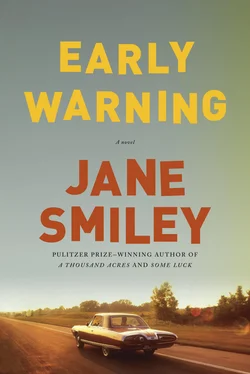Jane Smiley - Early Warning
Здесь есть возможность читать онлайн «Jane Smiley - Early Warning» весь текст электронной книги совершенно бесплатно (целиком полную версию без сокращений). В некоторых случаях можно слушать аудио, скачать через торрент в формате fb2 и присутствует краткое содержание. Год выпуска: 2015, Издательство: Knopf, Жанр: Современная проза, на английском языке. Описание произведения, (предисловие) а так же отзывы посетителей доступны на портале библиотеки ЛибКат.
- Название:Early Warning
- Автор:
- Издательство:Knopf
- Жанр:
- Год:2015
- ISBN:нет данных
- Рейтинг книги:5 / 5. Голосов: 1
-
Избранное:Добавить в избранное
- Отзывы:
-
Ваша оценка:
- 100
- 1
- 2
- 3
- 4
- 5
Early Warning: краткое содержание, описание и аннотация
Предлагаем к чтению аннотацию, описание, краткое содержание или предисловие (зависит от того, что написал сам автор книги «Early Warning»). Если вы не нашли необходимую информацию о книге — напишите в комментариях, мы постараемся отыскать её.
, a national best seller published to rave reviews from coast to coast.
Early Warning — читать онлайн бесплатно полную книгу (весь текст) целиком
Ниже представлен текст книги, разбитый по страницам. Система сохранения места последней прочитанной страницы, позволяет с удобством читать онлайн бесплатно книгу «Early Warning», без необходимости каждый раз заново искать на чём Вы остановились. Поставьте закладку, и сможете в любой момент перейти на страницу, на которой закончили чтение.
Интервал:
Закладка:
—
FOR HER PART, Emily Inez Nelson did the best she could with the materials she was given. She did not hold hands if she could help it, and she screamed when Mom put the harness around her. She found it easier to run without a diaper on, or any clothes, for that matter, and she cared nothing about whether she was cold or not, but when her diaper was heavy and her shoes were tight, she ran anyway. She could not yet climb over the side of her crib, or the end panel, but when she awakened at daylight, she got up immediately, gripped the railing, and lifted her feet as best she could, first the one and then the other; some mornings, she managed to hook her big toe, the one that went to market, over the top. She knew she was making progress. It was also important to make marks on flat surfaces. If she had to put her hand in her diaper to get something to mark with, so be it. However, color was better — she liked blue, red, orange, and yellow; she knew the names of all four of them, and could say “boo.” Her favorite things could only be done when Mom wasn’t in the room.
She knew what a book was, and that pages were for turning. She preferred books she wasn’t allowed to touch, with many pages for turning. She put her finger very carefully on the corner of the page, pressed it down, and pushed it back — then it would turn. She liked a certain tub with water in it, and cups. She liked to fill the cups and pour the water out, and she never poured it on the floor — she preferred to see it go into the other water and smooth itself out.
The only things that tasted good to her were breast milk and hard scrambled eggs. She did not like anything that slid through her fingers when she squeezed it; if it could be squeezed, she refused to eat it. She did not care to remain covered up in her crib or to keep a hat on outside or to be strapped into the seat of the grocery cart. She did not like it that Mom was everywhere, all the time. She never had a moment’s peace. Mom’s face leaned toward her and said, “Are you all right, honey?” Mom picked her up and carried her places when she was right in the middle of something. Mom set her in the high chair, in front of food, when the last thing in the world that she wanted to do was eat. Mom leaned over the bathtub the entire time she was in the bath; Mom held her one arm tightly while washing her, and this happened every day. Every time she said something, no matter to whom, Mom answered her, as if she were talking to Mom. Even when she was lying quietly in her crib, Mom leaned over her and listened to her. Emily tried the doors every single day, more than once. She knew some other people — most notably “Dad,” “Grandy,” “Eva,” who was like herself, Emily, but did nothing but stand and stare, and Eva’s “Jackie,” but none of them were like Mom. Emily did not know what to make of it all.
—
BETWEEN THE TIME Lillian made her appointment with the doctor and the appointment itself, she went through all of the five stages of grief, but she went through them on her own — there was nothing in the book about the stage of “telling your worried husband,” and so she did not address it. “Denial” was as easy as could be — she got Arthur to take her to see American Gigolo ; afterward, they went for ice cream, and Arthur had her laughing until her sides hurt every time he mimicked Richard Gere saying, “Helloo, Judy, you are a virry sexi leddy. Verri good lookn woman. Yu lak mi. Ah giv plejeur.” Then she would say, “How do you do it, Arthur, how do you seduce all those women? I think you’re guilty as sin.” Then he would stare at her very seriously and wiggle his head. It was harder when they got home, and she had to steer his hand subtly away from her right breast, but she was good at it, and even as they fell asleep, they were still giggling.
“Anger” happened the next day, when she chanced to see a woman she knew at the supermarket, a woman who made a point of gossiping equally about everyone they knew. She was friendly to Lillian in the canned-goods aisle, and happened to remark that she had seen “Mary Jo Canton’s new hairdo. Well, darling, hair don’t.” In the parking lot, when Lillian was pulling out and this woman was walking behind the boy pushing her very full cart to her very ample Mercedes-Benz (and who had one of those? Lillian would like to know), Lillian could not help reflecting that this woman was six years older than she, drank heavily, and was poisoned by malice. Surely she should be the one having a lump in her breast?
Obviously, Sunday was the day for “bargaining.” While they sat up in bed, reading articles in The Washington Post and The New York Times about Reagan and Ford being too old for the presidency and Bush having swiped all of Ford’s voters, and now this John Anderson fellow, whom Arthur rather liked — but at any rate, the Republicans had overcome the contentiousness between the right wing and the rest of the Party (they passed sections back and forth) — Lillian did quietly wonder what she would give up in order to avoid the coming ordeal. Maybe the house? No eggs? No steak? No Brie? No buttery popcorn? She shifted around on the bed, and Arthur offered her an article about the difference between people who draw the drapes and people who throw up the blinds: light-house people, dark-house people. Lillian enjoyed the article, but was there anything she should have done differently? Detergent? Breast-feeding? She could think of nothing else that was not human sacrifice, and if you came right down to it, that did seem to be the bargain that religion dealt in, didn’t it? Someone must die so that others may live. Mary Elizabeth? Tim? Lillian sighed, and Arthur said, “You okay, honey? You want another cup of coffee?”
Lillian said, “No, thanks. One’s enough today.” Really, she did want another cup of coffee, and when Arthur came back into the bedroom with his second, the fragrance was seductive. But giving up coffee was a start. Maybe.
Monday, she pretended to be asleep with her head buried in the pillow, and then, after Arthur left, she sat up and let the tears and sobs flow. It was all too easy to imagine herself dead, and it wasn’t good. She herself would be beyond sensation, she was pretty sure, and if not, then she felt she had done nothing to deserve punishment (through no virtue of her own — she had been taught to be a good girl, and she had been a good girl). But what Arthur and Debbie, especially, and maybe Janet and Dean would do without her, she literally could not imagine. Debbie called her every day; Arthur followed her around whenever he was not at work, and when he was at work, he called her in the morning and in the afternoon. Dean called her when he was worried about something, and Tina called her when she was excited about something. There was nothing oppressive about these calls — she loved them. They were the currency of news flowing freely, buoyed with jokes and funny stories, bits from TV, magazines, school. As soon as she thought of something funny or strange, she thought of who might enjoy it more, and called them — they did the same. But they would not as readily call one another. She was the switching station, the spot where information flowed to and from. Claire’s situation was shocking, now that Paul had refused to sign the papers and accused her of destroying her children and threatened to find a judge who would make sure she ended up without a penny, but wouldn’t Lillian’s own departure be even worse in its way, something her family could not make the best of? It seemed like this all day, all the way up to the moment when she mixed the mashed potatoes from the night before with an egg yolk and formed them into little patties, which she then breaded and fried, and then she thought maybe she was making too big a deal of this.
Читать дальшеИнтервал:
Закладка:
Похожие книги на «Early Warning»
Представляем Вашему вниманию похожие книги на «Early Warning» списком для выбора. Мы отобрали схожую по названию и смыслу литературу в надежде предоставить читателям больше вариантов отыскать новые, интересные, ещё непрочитанные произведения.
Обсуждение, отзывы о книге «Early Warning» и просто собственные мнения читателей. Оставьте ваши комментарии, напишите, что Вы думаете о произведении, его смысле или главных героях. Укажите что конкретно понравилось, а что нет, и почему Вы так считаете.











